While You Were Watching the Shutdown, Trump Freed the Coup Plotters
While every camera pointed at the Senate, Trump signed away justice for 77 co-conspirators.
📌 NOTE FOR NEW READERS:
The 50501 Movement organizes peaceful action across all 50 states to defend democracy. 80,000 subscribers strong and growing. If this resonates with you, hit subscribe and join the movement.
TL;DR
While the nation focused on the government shutdown ending, Trump quietly pardoned 77 people connected to the 2020 election subversion effort, including Rudy Giuliani, Mark Meadows, Sidney Powell, and the fake electors from swing states. Signed Friday and announced late Sunday night, the mass pardons were buried under shutdown headlines. It’s Ford’s Nixon pardon all over again only this time, the guilty never had to admit it.
Some of You Remember September of 1974
You were there. Maybe you were raising kids, or starting a career, or watching the news with your parents.
You remember the outrage when Gerald Ford pardoned Richard Nixon.
This was just one month after Nixon resigned in disgrace, Ford went on national television and granted him “a full, free and absolute pardon” for any crimes he may have committed as president. The nation was furious. Ford’s approval rating plummeted from 71% to 66% overnight. His press secretary, Jerry terHorst, resigned in protest. The New York Times called it “profoundly unwise, divisive and unjust.”
58% of Americans wanted Nixon prosecuted. And only 38% supported the pardon.
Ford never recovered.
Republicans lost 48 House seats and 4 Senate seats in the 1974 midterms. Ford lost the 1976 presidential election. It took twelve years until 1986 before a majority of Americans said Ford had done the right thing.
The public looked to the Senate floor for progress while another power play was unfolding off-camera, in the quiet hours of this past Sunday night.
The Quietest Hour of Power
The timing tells you everything…
Friday, November 7: Trump signs pardons for 77 people involved in trying to overturn the 2020 election.
Sunday, November 9: Senate holds rare Sunday session to break a filibuster on ending the 40-day government shutdown. News coverage saturates every major outlet with will the shutdown end? Will federal workers get paid? Will SNAP benefits resume?
Sunday, November 9, 7:54 PM: Ed Martin, Trump’s “clemency czar” and U.S. Pardon Attorney, posts the pardon proclamation to “X/Twitter”. 77 names. “Full, complete, and unconditional” pardons. All dated Friday but announced late Sunday night when most Americans were already asleep or exhausted from the shutdown news.
This was tactical burial.
And the list of names reads like a who’s who of the 2020 election subversion attempt.
The Coup That Didn’t Work And the 77 Who Tried Anyway
Trump pardoned everyone involved in the fake electors scheme, the plan to submit fraudulent electoral certificates from swing states that Joe Biden won, claiming Trump actually won them instead. These fake certificates were meant to give Vice President Mike Pence an excuse to refuse certifying Biden’s victory on January 6, 2021.
The Big Names:
Rudy Giuliani Trump’s personal lawyer who led the fake electors scheme and defamed Georgia election workers Ruby Freeman and Shaye Moss so viciously that they won a $148 million judgment against him. (He settled in January 2025 for an undisclosed amount after being found in contempt of court twice.) Giuliani has been disbarred in both New York and Washington, D.C.
Mark Meadows Trump’s White House Chief of Staff from March 2020 to January 2021. Faces state charges in Arizona and Georgia.
Sidney Powell The attorney who promoted baseless conspiracy theories about Dominion voting machines “flipping” votes. She plead guilty in the Georgia case and agreed to cooperate with prosecutors.
John Eastman The lawyer who wrote the memo outlining how Pence could refuse to certify the election. Facing possible disbarment in Washington, D.C.
Kenneth Chesebro The attorney who first proposed the fake electors scheme in a memo to Trump. He plead guilty in the Georgia case.
Jenna Ellis Former Trump attorney who promoted false fraud claims. She plead guilty in the Georgia case and struck a cooperation deal that led to her Arizona charges being dropped.
Jeffrey Clark The Justice Department official who tried to weaponize DOJ powers to overturn the election, drafted a letter claiming the department found “significant concerns” about fraud in Georgia (his superiors refused to send it). Now works at the Office of Management and Budget.
Boris Epshteyn Longtime Trump adviser and campaign lawyer who prosecutors say helped organize the scheme.
Christina Bobb Former senior election integrity counsel at the RNC, faces charges in Arizona.
All the Fake Electors:
The pardon covers fake electors from Arizona, Georgia, Michigan, Nevada, New Mexico, Pennsylvania, and Wisconsin, which are all states Joe Biden won but where Trump’s team submitted fraudulent electoral certificates.
Key names include:
Tyler Bowyer (Arizona fake elector)
Kathy Berden (Michigan fake elector)
James “Ken” Carroll (Georgia fake elector)
Brad Carver (Georgia fake elector)
Hank Choate (Michigan fake elector)
And dozens more across all seven states
Three of these people had already pleaded guilty and agreed to cooperate with prosecutors and Trump pardoned them anyway.
Trump explicitly stated the pardon “does not apply to the President of the United States, Donald J. Trump” dodging, at least for now, the thorny constitutional question of whether a president can pardon himself.
You Can’t Pardon a Conscience
Here’s something crucial that the pardon does NOT erase:
Presidential pardons only apply to criminal charges, not civil judgments.
Ruby Freeman and Shaye Moss, the two Georgia election workers whose lives Giuliani destroyed with his lies, sued him for defamation. A jury awarded them $148 million (later reduced to $146 million). Giuliani declared bankruptcy to avoid paying. He was found in contempt of court twice once for refusing to turn over his assets, and once for continuing to defame them even after losing the case.
In January 2025, Giuliani finally reached a settlement with Freeman and Moss. The terms weren’t disclosed publicly, but he got to keep his Manhattan apartment and Florida condo in exchange for paying them. The case was fully satisfied in February 2025.
Trump’s pardon cannot undo that civil judgment. As lawyer John Perlstein explained to Newsweek: “There is no such thing as a pardon in a civil case, so Mr. Giuliani will remain beholden to the two election workers for the rest of his life.”
Freeman and Moss spent four years fighting to clear their names. They testified before Congress. They described the death threats, the harassment, the fear. “There is nowhere I feel safe. Nowhere,” Freeman said in her 2022 testimony.
The Fake Electors Still Face State Charges
Presidential pardons don’t cover state crimes.
And prosecutors in Arizona, Georgia, Wisconsin, and Nevada are making it crystal clear: these pardons change nothing about their cases.
Arizona
Attorney General Kris Mayes (a Democrat) faces a November 21 deadline to decide whether to take the case back to a grand jury after a judge ruled prosecutors failed to properly present the full text of the Electoral Count Act. Her spokesperson said the pardons will “have no impact on the state’s case.”
The Arizona case includes 18 defendants facing nine criminal charges related to the fake elector scheme. Trump is identified as “unindicted co-conspirator 1” in the indictment.
Georgia
The case against the fake electors hit a major roadblock when Fulton County DA Fani Willis was disqualified over allegations of a romantic relationship with lead prosecutor Nathan Wade. The Georgia Supreme Court let that disqualification stand.
Now the Prosecuting Attorneys’ Council of Georgia has until November 14 to assign a new prosecutor to decide whether to proceed with the case. Pete Skandalakis, the council’s executive director, said they will continue “without being influenced by matters outside the scope of our assigned task.”
Three Georgia fake electors were charged. Eight others got immunity in exchange for cooperation.
Wisconsin
The case is continuing. State prosecutors have not commented publicly on Trump’s pardons.
Nevada
The attorney general is dealing with appeals in one county while also pursuing charges in another county as a backup strategy.
Michigan
In September, a judge dismissed the Michigan case against 15 Republicans accused of falsely certifying Trump as the winner.
Nixon Resigned. Trump’s Immunity Would Have Protected Him.
If you’re old enough to remember Watergate, you’ll recognize this.
Ford pardoned Nixon to “heal the nation” and “move forward.” He said a long trial would be too divisive and too polarizing. And it would be better to put it all behind us.
The public didn’t buy it. 58% of Americans wanted Nixon prosecuted. The pardon looked like a corrupt bargain. Rumors swirled that Nixon had resigned in exchange for Ford’s promise to pardon him. (Ford denied this, and no evidence ever surfaced.)
What happened:
Ford’s approval rating dropped immediately
Republicans lost 48 House seats and 4 Senate seats in the 1974 midterms
Ford lost the 1976 presidential election to Jimmy Carter
It took 12 years before most Americans said Ford made the right call
But Ford at least followed the legal framework that existed in 1974.
When Nixon accepted the pardon, he was accepting guilt. The Supreme Court had ruled in Burdick v. United States (1915) that accepting a pardon carries “an imputation of guilt” and is effectively “a confession.” Ford made sure Nixon understood this before extending the pardon.
Nixon resigned. He accepted the pardon. He acknowledged wrongdoing (though he never used those exact words). Forty-eight people went to prison for Watergate. Nixon avoided prosecution, but he didn’t avoid accountability entirely.
Now, in 2025, we have something Nixon never had: the Supreme Court’s immunity ruling from Trump v. United States (2024).
That ruling grants presidents broad immunity from criminal prosecution for any “official acts.” Legal scholars who testified at a 2024 panel on the Nixon pardon were unanimous in their assessment: If Trump immunity had existed in 1974, Nixon wouldn’t have needed a pardon at all. His Watergate conduct would have been protected as “official acts.”
John Dean, Nixon’s White House Counsel who became a key Watergate witness, said: “Virtually all of his Watergate conduct would be immune activity.”
Law professor Barbara McQuade warned: “You really do have to be careful with your vote, with who you put in the White House, because all the guardrails are gone.”
That’s the difference between 1974 and 2025.
Ford’s pardon was controversial but operated within constitutional norms. Trump’s pardons operate in a landscape where the Supreme Court has already said presidents can commit crimes as long as they use their official powers to do it.
This isn’t just pardoning allies. This is creating a two-tier justice system where loyalty to Trump means immunity from consequences even for trying to overturn an election.
What This Pardon Accomplishes
These 77 pardons are largely symbolic in one sense, none of the people pardoned were charged with federal crimes. Special Counsel Jack Smith named some of them as “unindicted co-conspirators” in his case against Trump, but never brought charges.
Why is this important?
1. It Prevents Future Federal Prosecution
Even though they weren’t charged, the pardon ensures they never can be charged federally. It closes that door permanently.
2. It Sends A Message To Future Election Subverters
Sean Morales-Doyle, Director of Voting Rights and Elections at the Brennan Center for Justice, told the Arizona Mirror:
“I think the pardon is a shift in the environment in which people are acting, and people who might be tempted to try to challenge legitimate outcomes and subvert the outcomes of elections have to think about the consequences of doing that and this changes the set of outcomes they may face.”
Translation: If you help Trump overturn an election, he’ll protect you. Break the law for him, and you’ll be pardoned.
This is exactly what happened with the January 6 pardons. Trump pardoned approximately 1,500 people convicted for participating in the Capitol insurrection, including Enrique Tarrio, the Proud Boys chairman convicted of seditious conspiracy and sentenced to 22 years, who walked free.
3. It Attempts To Rewrite History
The White House press secretary, Karoline Leavitt, said in a statement: “These great Americans were persecuted and put through hell by the Biden Administration for challenging an election, which is the cornerstone of democracy.”
“Challenging an election” is not what these people did.
They didn’t file lawsuits. They didn’t request recounts. They didn’t petition for audits. They created fraudulent legal documents claiming Trump won states he lost, and submitted them to Congress to try to block the certification of Joe Biden’s victory.
Courts, audits, and investigations have repeatedly confirmed the 2020 election results were sound. Trump lost, and Biden won.
What these 77 people did was attempt to overturn a legitimate election through fraud and intimidation. And Trump calls them heroes.
Keep Receipts: The Complete List
We’re documenting every name Trump pardoned, because this list will matter in 2026 and beyond.
The complete 77 names include (but are not limited to):
Major Figures:
Rudy Giuliani
Mark Meadows
Sidney Powell
John Eastman
Kenneth Chesebro
Jenna Ellis
Jeffrey Clark
Boris Epshteyn
Christina Bobb
Fake Electors & Others:
Tyler Bowyer (AZ)
Joseph Brannan (GA)
James “Ken” Carroll (GA)
Brad Carver (GA)
Robert Cheeley (GA attorney)
Hank Choate (MI)
Kathy Berden (MI)
Mark Amick (GA)
C.B. Yadav (GA)
Michael Ward (AZ)
Full list of all 77 names available in the pardon proclamation posted by Ed Martin
Why should we remember these names?
Because when these people run for office or seek positions of public trust, we need to remember: Trump pardoned them for attempting to overturn an election.
In 1974, Ford’s pardon of Nixon defined his presidency and cost him re-election. These 77 pardons should define Trump’s second term and the Republican Party that enables him.
Four Action Steps
1. Call Your State Attorney General (If You’re In A Swing State)
If you live in Arizona, Georgia, Wisconsin, or Nevada, states where fake elector prosecutions are still pending, call your state attorney general’s office. Tell them you support continuing the prosecution despite Trump’s federal pardons.
Arizona Attorney General Kris Mayes: (602) 542-5025
Georgia (Prosecuting Attorneys’ Council): (404) 969-4001
Wisconsin Attorney General Josh Kaul: (608) 266-1221
Nevada Attorney General Aaron Ford: (775) 684-1100
Script: “I’m calling to express my support for continuing the prosecution of the fake electors cases despite President Trump’s pardons. Presidential pardons don’t apply to state crimes, and Arizonans/Georgians/Wisconsinites/Nevadans deserve accountability for attempts to overturn our election results. Please don’t let these pardons discourage you from pursuing justice.”
2. Call Your U.S. Senators
The Senate just voted to end the government shutdown. They need to hear from constituents about Trump’s abuse of pardon power.
Capitol Switchboard: (202) 224-3121
Script: “I’m calling to express my deep concern about President Trump’s pardons for 77 people who attempted to overturn the 2020 election. This abuse of pardon power creates a two-tier justice system where loyalty to Trump means immunity from consequences. I’m asking Senator [Name] to publicly condemn these pardons and support legislation to reform presidential pardon powers.”
3. Document And Remember
Save this post. Bookmark the list of 77 names. When these people run for office or seek positions of public trust, we need to remember what they did and that Trump pardoned them for it.
4. Support Ruby Freeman And Shaye Moss
The two Georgia election workers who Giuliani defamed are still recovering from four years of death threats and harassment. While Giuliani settled the civil case, their suffering was real.
If you want to support election workers generally, consider:
Donating to the Election Official Legal Defense Network (protects election officials from frivolous lawsuits)
Volunteering to be a poll worker in your community
Speaking up when you see election workers being harassed or threatened
One more quick thing:
If you’re on Facebook and part of our community group, would you please leave our community 50501 page a 5-star review by clicking here? Thousands of people learn about our protests and actions through that platform, and reviews help the algorithm show our page to more people looking for organized resistance. (We’re not Meta fans either, but we’re trying to meet people where they are to grow our presence)
You Remember Nixon. Will You Remember This?
You remember September 1974.
You remember the outrage when Ford pardoned Nixon, how it felt like justice was being denied, like powerful people were escaping accountability while Americans suffered consequences for far smaller offenses.
You remember that Ford never recovered. That Republicans paid the price in the midterms. That it took twelve years before most Americans grudgingly accepted that maybe Ford had made the right call.
Because unlike Nixon, Trump isn’t accepting guilt. Unlike the Watergate conspirators who went to prison, these 77 people are being celebrated as heroes. And unlike 1974, we now have a Supreme Court ruling that says presidents can commit crimes as long as they use their official powers.
State prosecutors in Arizona and Georgia are standing firm. Ruby Freeman and Shaye Moss already won their civil case. And we’re documenting every name on this list so that when 2026 and 2028 roll around, voters remember exactly what happened here.
We’ve seen this movie before. We know how it ends.
The question is: Will we make them pay the same electoral price Ford paid in 1974?
What do you remember about Ford pardoning Nixon? How does this compare? Share your memories below.
Although this is not a 50501 Hosted Event, please consider joining the Removal Coalition in going to DC on 11/22
THANK YOU
To Everyone Who Noticed What Wasn’t Supposed to Be Seen
Democracy doesn’t die when power breaks the law.
It dies when people stop paying attention.
So thank you to our thousands of readers for still paying attention.
For keeping receipts when others move on.
And for proving that even when justice gets buried, someone’s still watching the ground.
This holiday season, we’re saying it loud and clear: We Ain’t Buying It.
For too long, corporations have profited while our communities face attacks on workers, families, and racial equity.
From Thanksgiving through Cyber Monday, we’re taking action with our wallets to demand accountability.
This is to help us build power, protect our communities, and show corporations that our values aren’t for sale.
Scan the QR or visit weaintbuyingit.com for more information.
Help us get the word out by sharing this everywhere.
These newsletters are created 5 mornings a week. We do it because this moment in history demands that we document what’s happening, connect it to what we’ve seen before, and figure out together what comes next through observation and education.
Your paid subscription directly supports this work. Every paid subscriber helps this publication spend more time researching, fact-checking, writing, creating, and expanding what we can do.
Thank you for reading
Blue | The 50501 Movement | 80,000+ Readers Strong | fiftyfifty.one




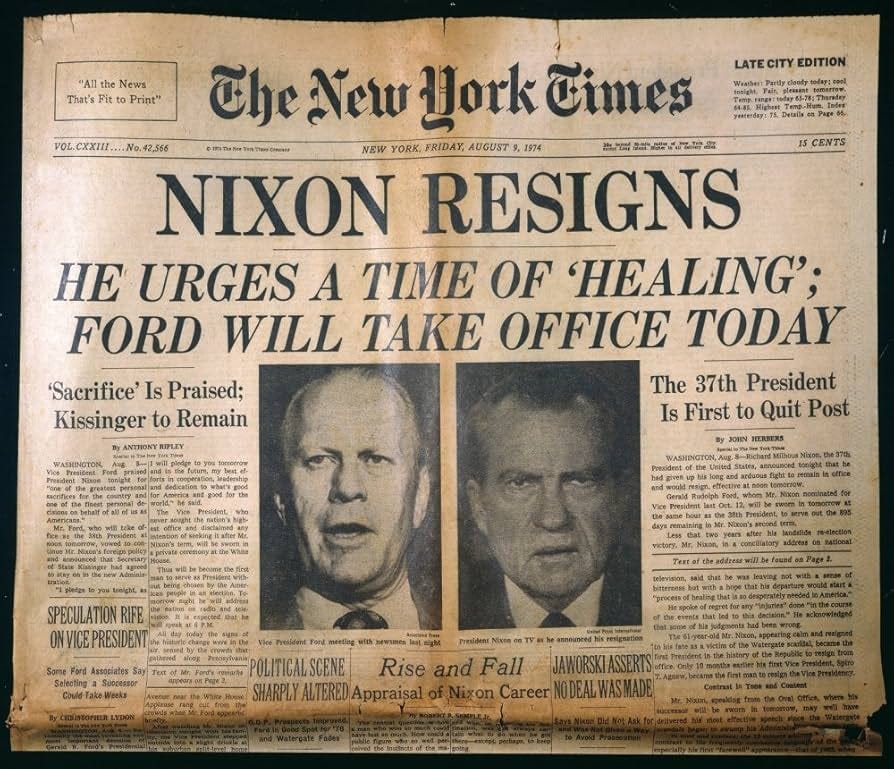
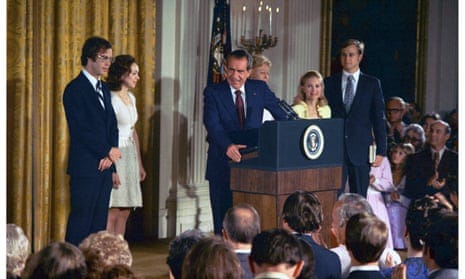
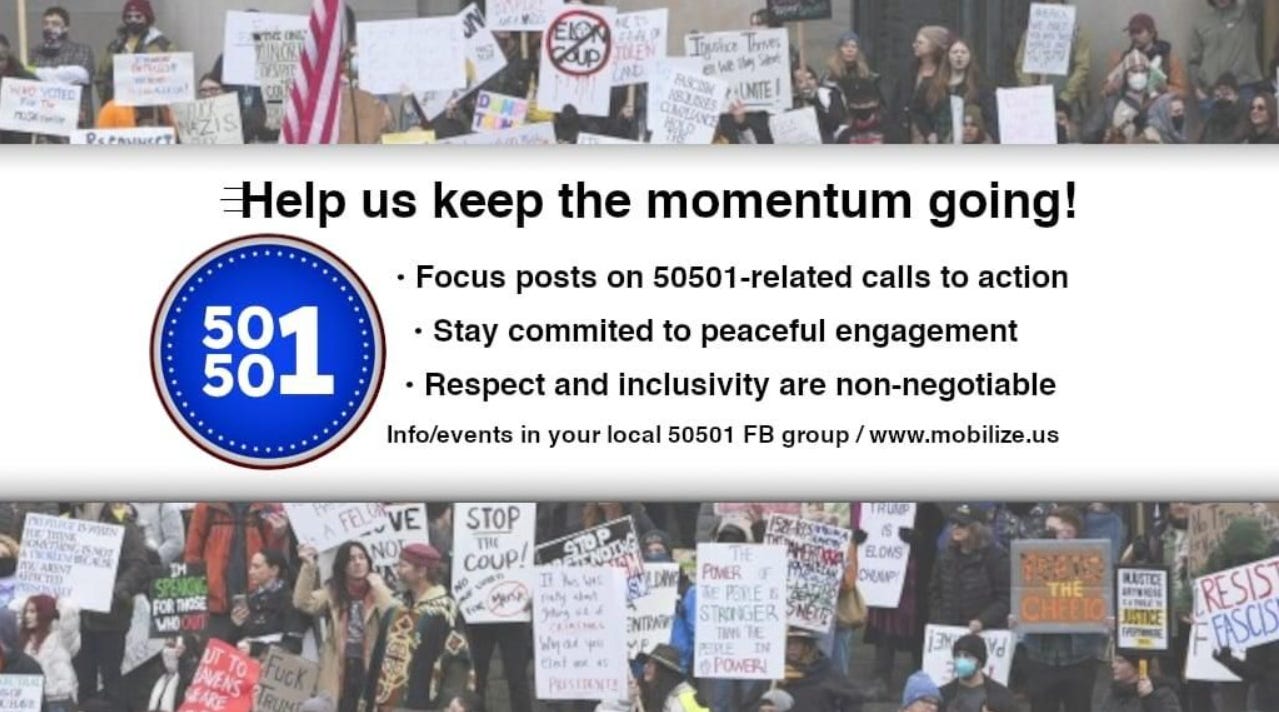
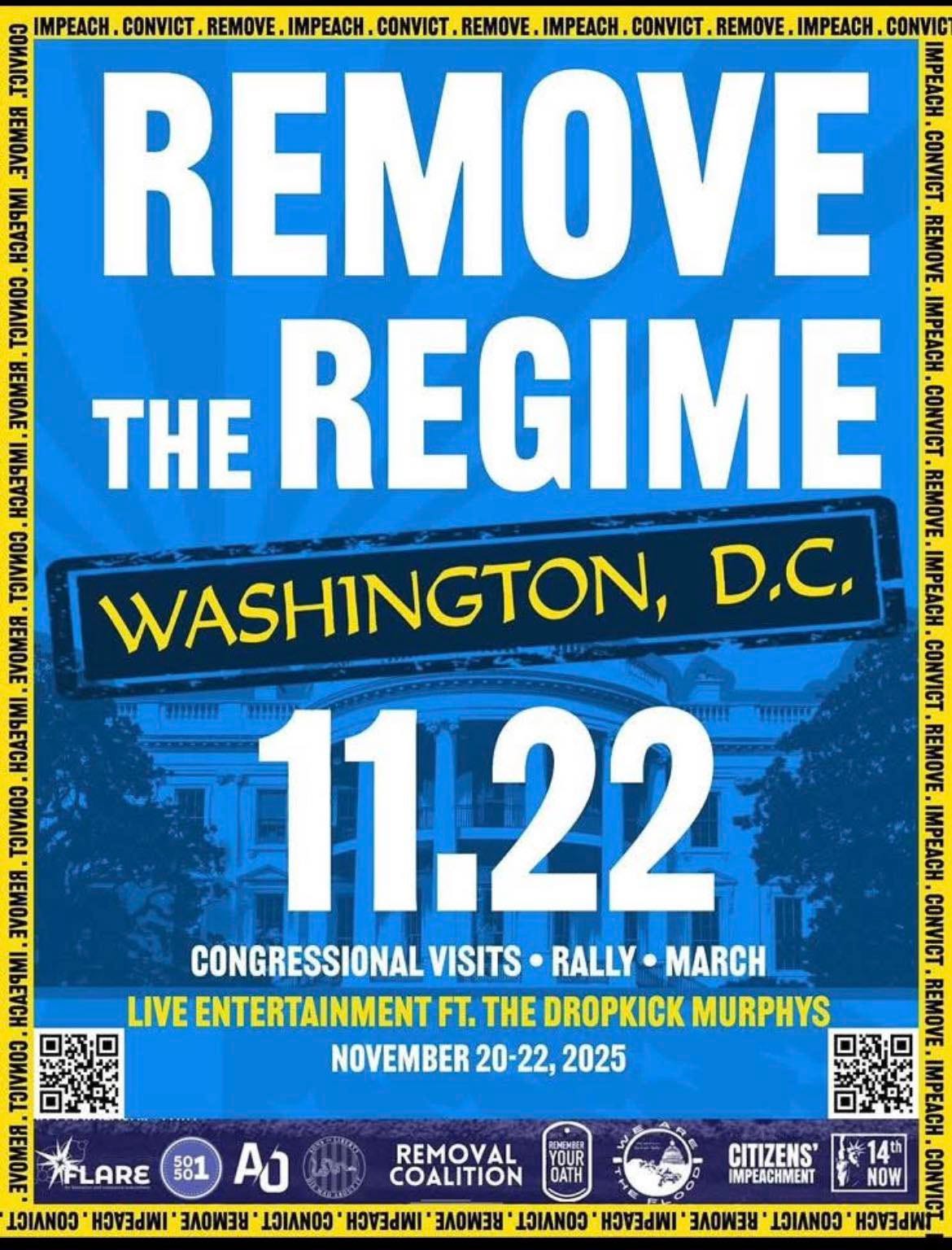
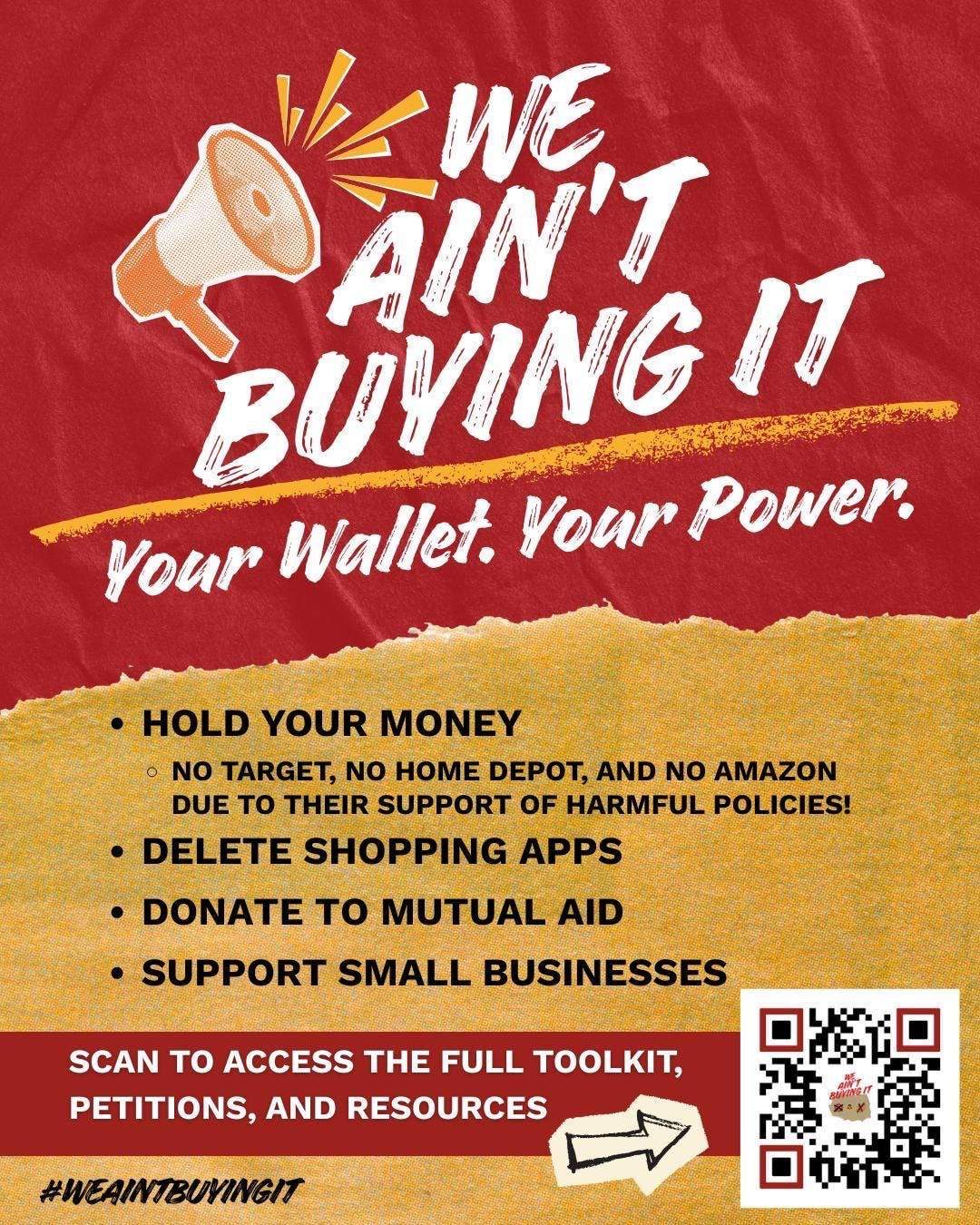
There’s one thing here we all have to learn - Trump is vengeful, even when he gets his way. When have all of the pardons come? When voters are distracted! We have to keep watching, whether it’s a victory for us or for Teflon! When he said “I am your retribution”, he was talking about his own issues, not anyone else’s.
You are correct that this whole thing was to some degree buried in the constantly overwhelming 'news', but it did not go unnoticed by many of us. The only hopeful part about it is that the pardons are not comprehensive, and most people at this point are fully aware of the racket that it all is. Maybe there is still some justice to come.